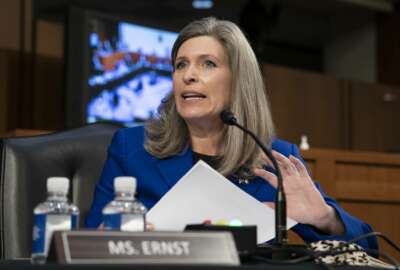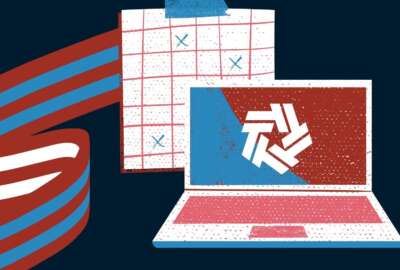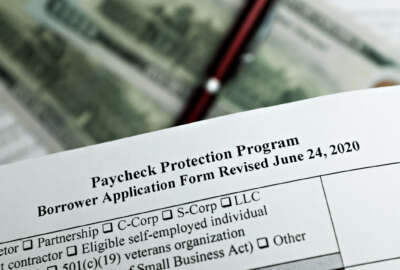 First Look
First Look  First Look
First Look The total number of federal contracting dollars going to small businesses keeps going up year over year.
The Small Business Administration expects the federal government to meet upcoming targets for more of its contract spending to go to small companies, but is trying to reverse a significant decline in the number of small firms actually doing business in the federal marketplace.
The total number of federal contracting dollars going to small businesses keeps going up year over year. More than $154 billion in federal contracts went to small businesses in fiscal 2021 — about 27% of all government contract spending that year.
The Biden administration, as part of its equity agenda, has set a higher bar for making sure more of that federal contract spending goes to minority-owned small businesses.
Beyond total contract spending, however, agencies are seeing a significant drop in the number of small businesses that receive government contracts.
The federal government is seeing an even sharper decline in the number of small businesses that are new or recent entrants to the federal marketplace.
“That is a bit of a puzzle as to why, with even greater opportunity, there are fewer small businesses that are participating in the industrial base,” Sam Le, the director of Policy, Planning, and Liaison within SBA’s Office of Government Contracting and Business Development, said in an interview last week. “It’s any number of factors that we’ve identified at SBA and with agencies. We don’t think there’s one thing that has caused this to happen.”
Agencies since 2010 have seen about a 40% decrease in the number of small businesses receiving prime contract awards.
Over the same period of time, the number of small companies doing business with the federal government for the first time has decreased by about 60% — and over the past 15 years, new entrants have dropped by approximately 80%.
“That creates concerns about the willingness of private companies to work with the government and the ability for the government to find new, innovative products and get the best value for their contracting dollar,” Le said.
SBA is taking steps to reverse that trend and get new small businesses to compete for federal contracts by enrolling more companies into its small business certification programs.
Le said that companies that participate in SBA’s contracting certification and business development programs are more likely to stay in federal contracting.
“We’re doing our best to get companies that are eligible to get into the programs and keep them in there, and give them the development assistance they need to go out and find contracts,” he said.
Le said SBA works with each agency to find a “reasonable goal” for small business contracting, in order to meet the 15% target by FY 2025.
“Not every agency has the same 15% goal. Most agencies are actually higher than 15%, so we work with each agency to figure out what the opportunity is for finding small, disadvantaged businesses,” he said.
The White House is calling on agencies to spend 15% of their contracting dollars on small, disadvantaged businesses — including women-owned, Black-owned and Hispanic-owned small businesses — by FY 2025. SBA expects agencies are on track to meet that goal.
The Biden administration set an interim goal of having 11% of governmentwide contracting dollars go to small, disadvantaged businesses in FY 2022.
SBA expects to release the 2022 government procurement scorecard this summer. But if recent trends are any indication, agencies are on track to meet the goal.
More than 11% of federal contracting dollars already went to small businesses in FY 2021.
“We essentially met that goal a year early, by having the government spend 11.01% of all contracting dollars with small, disadvantaged businesses,” Le said. “So in terms of getting to these goals, and these interim goals, we’re doing quite well and look forward to meeting that goal of 15% by fiscal year 2025.”
The Biden administration showcased its small business policies last week as part of National Small Business Week.
President Joe Biden said last Monday that small businesses employ nearly half of all private-sector workers, and are “one of the best investments America can make.”
“You’re involved in and you’re innovative across every single solitary industry,” Biden said during a May 1 Rose Garden ceremony at the White House.
SBA Administrator Isabel Guzman said the Biden administration, through the Bipartisan Infrastructure Law and the Inflation Reduction Act, is taking steps to “make sure our small businesses continue to survive and thrive by investing in America and creating billions of dollars of opportunity.”
To get more small businesses to compete for federal contracts, the Office of Management and Budget and the General Services Administration earlier this spring launched a governmentwide procurement equity tool and supplier base dashboard to help agencies track how much of their contract spending is going to small businesses that are new or recent entrants to federal contracting.
“It’s really just up to the businesses to market themselves to the government and sign up in Sam.gov to find contracts, look for opportunities. And then on the other side, for agencies to conduct outreach to those businesses and consider them and their competition,” Le said.
The White House, as part of National Small Business Week, hosted small business award winners from all 50 states.
Le said this year’s winners show that small businesses are the “backbone of the American economy.”
“The federal government is relying on them to get them the services they need to be able to compete with our near-peer competitors, and to be able to move the economy,” Le said.
“The pitch to agencies is this government is not going to be able to meet the rest of its missions, or whatever else is coming from the administration,” he said. “Unless you work with small businesses. Those are the businesses that have the best ideas, and they’re going to be able to give you the best.”
SBA is also taking steps to improve the customer experience of small businesses applying for certification online. The certification is needed for small businesses to compete in sole-source and set-aside contracts.
“All businesses in all of SBA’s programs have seen the online experience improve, and we’re working with agencies and with our contracting partners to make those applications even more streamlined and easier to use,” Le said.
Copyright © 2024 Federal News Network. All rights reserved. This website is not intended for users located within the European Economic Area.
Jory Heckman is a reporter at Federal News Network covering U.S. Postal Service, IRS, big data and technology issues.
Follow @jheckmanWFED
 First Look
First Look 


